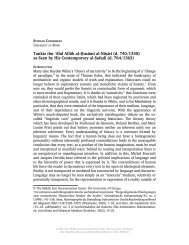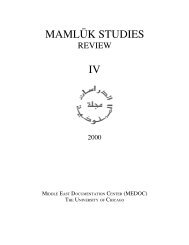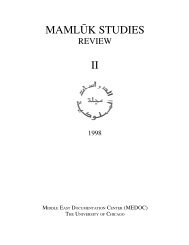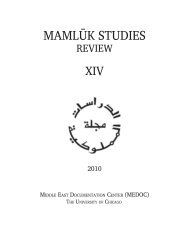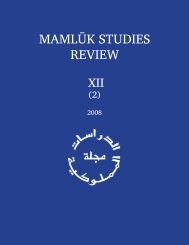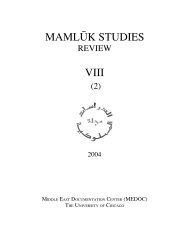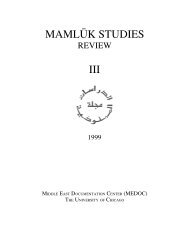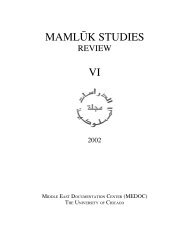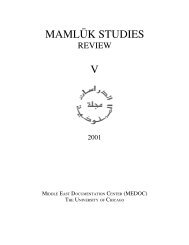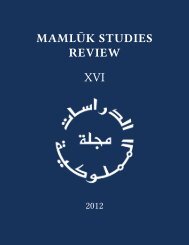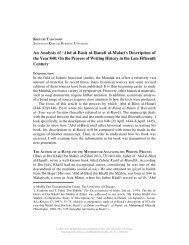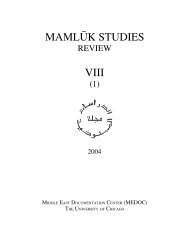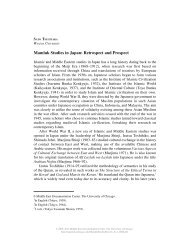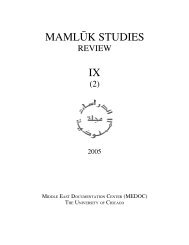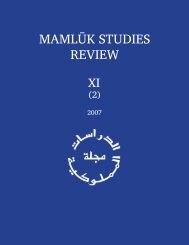- Page 1 and 2: MAMLU±K STUDIES REVIEW VII 2003 MI
- Page 3 and 4: MAMLU±K STUDIES REVIEW Editor BRUC
- Page 5 and 6: ARTICLES CONTENTS Mamluk Literature
- Page 7 and 8: Click any item in the Table of Cont
- Page 9 and 10: 2 ROBERT IRWIN, MAMLUK LITERATURE B
- Page 11 and 12: 4 ROBERT IRWIN, MAMLUK LITERATURE H
- Page 13 and 14: 6 ROBERT IRWIN, MAMLUK LITERATURE p
- Page 15 and 16: 8 ROBERT IRWIN, MAMLUK LITERATURE T
- Page 17 and 18: 10 ROBERT IRWIN, MAMLUK LITERATURE
- Page 19 and 20: 12 ROBERT IRWIN, MAMLUK LITERATURE
- Page 21 and 22: 14 ROBERT IRWIN, MAMLUK LITERATURE
- Page 23 and 24: 16 ROBERT IRWIN, MAMLUK LITERATURE
- Page 25 and 26: 18 ROBERT IRWIN, MAMLUK LITERATURE
- Page 27 and 28: 20 ROBERT IRWIN, MAMLUK LITERATURE
- Page 29 and 30: 22 ROBERT IRWIN, MAMLUK LITERATURE
- Page 31 and 32: 24 ROBERT IRWIN, MAMLUK LITERATURE
- Page 33 and 34: 26 ROBERT IRWIN, MAMLUK LITERATURE
- Page 35: 28 ROBERT IRWIN, MAMLUK LITERATURE
- Page 39 and 40: MAMLU±K STUDIES REVIEW VOL. 7, 200
- Page 41 and 42: MAMLU±K STUDIES REVIEW VOL. 7, 200
- Page 43 and 44: MAMLU±K STUDIES REVIEW VOL. 7, 200
- Page 45 and 46: MAMLU±K STUDIES REVIEW VOL. 7, 200
- Page 47 and 48: MAMLU±K STUDIES REVIEW VOL. 7, 200
- Page 49 and 50: [Babylon took from him some of thes
- Page 51 and 52: MAMLU±K STUDIES REVIEW VOL. 7, 200
- Page 53 and 54: MAMLU±K STUDIES REVIEW VOL. 7, 200
- Page 55 and 56: THOMAS BAUER UNIVERSITÄT MÜNSTER
- Page 57 and 58: MAMLU±K STUDIES REVIEW VOL. 7, 200
- Page 59 and 60: MAMLU±K STUDIES REVIEW VOL. 7, 200
- Page 61 and 62: MAMLU±K STUDIES REVIEW VOL. 7, 200
- Page 63 and 64: MAMLU±K STUDIES REVIEW VOL. 7, 200
- Page 65 and 66: MAMLU±K STUDIES REVIEW VOL. 7, 200
- Page 67 and 68: MAMLU±K STUDIES REVIEW VOL. 7, 200
- Page 69 and 70: MAMLU±K STUDIES REVIEW VOL. 7, 200
- Page 71 and 72: MAMLU±K STUDIES REVIEW VOL. 7, 200
- Page 73 and 74: MAMLU±K STUDIES REVIEW VOL. 7, 200
- Page 75 and 76: MAMLU±K STUDIES REVIEW VOL. 7, 200
- Page 77 and 78: MAMLU±K STUDIES REVIEW VOL. 7, 200
- Page 79 and 80: MAMLU±K STUDIES REVIEW VOL. 7, 200
- Page 81 and 82: MAMLU±K STUDIES REVIEW VOL. 7, 200
- Page 83 and 84: MAMLU±K STUDIES REVIEW VOL. 7, 200
- Page 85 and 86: MAMLU±K STUDIES REVIEW VOL. 7, 200
- Page 87 and 88:
MAMLU±K STUDIES REVIEW VOL. 7, 200
- Page 89 and 90:
MAMLU±K STUDIES REVIEW VOL. 7, 200
- Page 91 and 92:
MAMLU±K STUDIES REVIEW VOL. 7, 200
- Page 93 and 94:
MAMLU±K STUDIES REVIEW VOL. 7, 200
- Page 95 and 96:
MAMLU±K STUDIES REVIEW VOL. 7, 200
- Page 97 and 98:
Í—«cŽ ‚u t²IÐ√ UNMJ —U
- Page 99 and 100:
MAMLU±K STUDIES REVIEW VOL. 7, 200
- Page 101 and 102:
MAMLU±K STUDIES REVIEW VOL. 7, 200
- Page 103 and 104:
98 EVERETT K. ROWSON, AN ALEXANDRIA
- Page 105 and 106:
100 EVERETT K. ROWSON, AN ALEXANDRI
- Page 107 and 108:
102 EVERETT K. ROWSON, AN ALEXANDRI
- Page 109 and 110:
104 EVERETT K. ROWSON, AN ALEXANDRI
- Page 111 and 112:
106 EVERETT K. ROWSON, AN ALEXANDRI
- Page 113 and 114:
108 EVERETT K. ROWSON, AN ALEXANDRI
- Page 115 and 116:
110 EVERETT K. ROWSON, AN ALEXANDRI
- Page 117 and 118:
112 MUHSIN JASSIM AL-MUSAWI, AL-QAL
- Page 119 and 120:
114 MUHSIN JASSIM AL-MUSAWI, AL-QAL
- Page 121 and 122:
116 MUHSIN JASSIM AL-MUSAWI, AL-QAL
- Page 123 and 124:
118 MUHSIN JASSIM AL-MUSAWI, AL-QAL
- Page 125 and 126:
120 MUHSIN JASSIM AL-MUSAWI, AL-QAL
- Page 127 and 128:
122 MUHSIN JASSIM AL-MUSAWI, AL-QAL
- Page 129 and 130:
124 MUHSIN JASSIM AL-MUSAWI, AL-QAL
- Page 131 and 132:
126 MUHSIN JASSIM AL-MUSAWI, AL-QAL
- Page 133 and 134:
128 MUHSIN JASSIM AL-MUSAWI, AL-QAL
- Page 135 and 136:
130 MUHSIN JASSIM AL-MUSAWI, AL-QAL
- Page 137 and 138:
132 MUHSIN JASSIM AL-MUSAWI, AL-QAL
- Page 139 and 140:
134 MUHSIN JASSIM AL-MUSAWI, AL-QAL
- Page 141 and 142:
THOMAS HERZOG UNIVERSITY OF HALLE T
- Page 143 and 144:
MAMLU±K STUDIES REVIEW VOL. 7, 200
- Page 145 and 146:
MAMLU±K STUDIES REVIEW VOL. 7, 200
- Page 147 and 148:
MAMLU±K STUDIES REVIEW VOL. 7, 200
- Page 149 and 150:
MAMLU±K STUDIES REVIEW VOL. 7, 200
- Page 151 and 152:
MAMLU±K STUDIES REVIEW VOL. 7, 200
- Page 153 and 154:
AMILA BUTUROVI YORK UNIVERSITY The
- Page 155 and 156:
MAMLU±K STUDIES REVIEW VOL. 7, 200
- Page 157 and 158:
MAMLU±K STUDIES REVIEW VOL. 7, 200
- Page 159 and 160:
MAMLU±K STUDIES REVIEW VOL. 7, 200
- Page 161 and 162:
MAMLU±K STUDIES REVIEW VOL. 7, 200
- Page 163 and 164:
MAMLU±K STUDIES REVIEW VOL. 7, 200
- Page 165 and 166:
MAMLU±K STUDIES REVIEW VOL. 7, 200
- Page 167 and 168:
MAMLU±K STUDIES REVIEW VOL. 7, 200
- Page 169 and 170:
MAMLU±K STUDIES REVIEW VOL. 7, 200
- Page 171 and 172:
MAMLU±K STUDIES REVIEW VOL. 7, 200
- Page 173 and 174:
MAMLU±K STUDIES REVIEW VOL. 7, 200
- Page 175 and 176:
MAMLU±K STUDIES REVIEW VOL. 7, 200
- Page 177 and 178:
MAMLU±K STUDIES REVIEW VOL. 7, 200
- Page 179 and 180:
MAMLU±K STUDIES REVIEW VOL. 7, 200
- Page 181 and 182:
LI GUO UNIVERSITY OF NOTRE DAME The
- Page 183 and 184:
MAMLU±K STUDIES REVIEW VOL. 7, 200
- Page 185 and 186:
MAMLU±K STUDIES REVIEW VOL. 7, 200
- Page 187 and 188:
MAMLU±K STUDIES REVIEW VOL. 7, 200
- Page 189 and 190:
MAMLU±K STUDIES REVIEW VOL. 7, 200
- Page 191 and 192:
MAMLU±K STUDIES REVIEW VOL. 7, 200
- Page 193 and 194:
MAMLU±K STUDIES REVIEW VOL. 7, 200
- Page 195 and 196:
MAMLU±K STUDIES REVIEW VOL. 7, 200
- Page 197 and 198:
[Al-jamshu f| al-na≠si qabla al-n
- Page 199 and 200:
Her breath stinks like farting, or
- Page 201 and 202:
MAMLU±K STUDIES REVIEW VOL. 7, 200
- Page 203 and 204:
MAMLU±K STUDIES REVIEW VOL. 7, 200
- Page 205 and 206:
MAMLU±K STUDIES REVIEW VOL. 7, 200
- Page 207 and 208:
∂± Ádý懎º t‡‡²³×
- Page 209 and 210:
TEXTUAL NOTES MAMLU±K STUDIES REVI
- Page 211 and 212:
MAMLU±K STUDIES REVIEW VOL. 7, 200
- Page 213 and 214:
MAMLU±K STUDIES REVIEW VOL. 7, 200
- Page 215 and 216:
212 TH. EMIL HOMERIN, THE MYSTICAL
- Page 217 and 218:
214 TH. EMIL HOMERIN, THE MYSTICAL
- Page 219 and 220:
216 TH. EMIL HOMERIN, THE MYSTICAL
- Page 221 and 222:
218 TH. EMIL HOMERIN, THE MYSTICAL
- Page 223 and 224:
220 TH. EMIL HOMERIN, THE MYSTICAL
- Page 225 and 226:
222 TH. EMIL HOMERIN, THE MYSTICAL
- Page 227 and 228:
224 TH. EMIL HOMERIN, THE MYSTICAL
- Page 229 and 230:
226 TH. EMIL HOMERIN, THE MYSTICAL
- Page 231 and 232:
228 TH. EMIL HOMERIN, THE MYSTICAL
- Page 233 and 234:
230 TH. EMIL HOMERIN, THE MYSTICAL
- Page 235 and 236:
232 TH. EMIL HOMERIN, THE MYSTICAL
- Page 237 and 238:
234 TH. EMIL HOMERIN, THE MYSTICAL
- Page 239 and 240:
236 NASSER RABBAT, LAILA ‘ALI IBR
- Page 241 and 242:
238 BOOK REVIEWS as elsewhere, Raba
- Page 243 and 244:
240 BOOK REVIEWS The present study
- Page 245 and 246:
242 BOOK REVIEWS castle) be continu
- Page 247 and 248:
244 BOOK REVIEWS especially regardi
- Page 249 and 250:
246 BOOK REVIEWS parts were added b
- Page 251 and 252:
248 BOOK REVIEWS and death were maj
- Page 253 and 254:
250 BOOK REVIEWS period between the
- Page 255 and 256:
252 BOOK REVIEWS She also points ou
- Page 257 and 258:
254 BOOK REVIEWS The approach the c
- Page 259 and 260:
256 BOOK REVIEWS reveals that a vas
- Page 261 and 262:
258 BOOK REVIEWS to writing the bio
- Page 263 and 264:
260 BOOK REVIEWS The author of the
- Page 265 and 266:
262 BOOK REVIEWS to high literature
- Page 267 and 268:
264 BOOK REVIEWS history of medieva
- Page 269 and 270:
266 BOOK REVIEWS that the "Sultan o
- Page 271 and 272:
268 BOOK REVIEWS result was that he
- Page 273 and 274:
270 BOOK REVIEWS ulama. The last gr
- Page 275:
272 BOOK REVIEWS common people, nor



